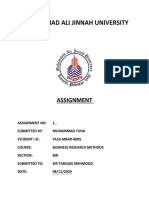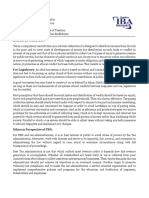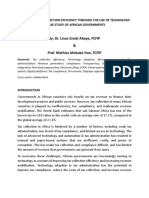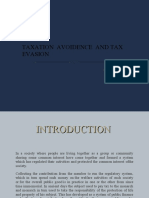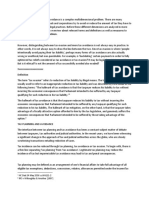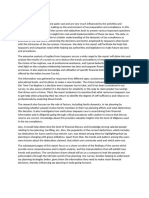0 ratings0% found this document useful (0 votes)
21 viewsPolicy Brief - Administrative Corruption v2 PDF
Policy Brief - Administrative Corruption v2 PDF
Uploaded by
APPROCenterAdministrative corruption in tax collection is a major problem in Afghanistan. Tax officials systematically find faults with tax forms to demand bribes from taxpayers for "assistance". Citizens are subjected to pressure from corrupt officials to pay bribes in order to receive services. While the government has made efforts to digitize systems, corruption persists due to a lack of clear procedures, arbitrariness in tax calculations, and unprofessional conduct by tax officials. Most Afghans see administrative corruption as violating Islamic principles. Reforms are needed such as simplifying forms, increasing tax law literacy, addressing small businesses' needs, and monitoring taxpayer-official interactions to curb corruption.
Copyright:
© All Rights Reserved
Available Formats
Download as PDF, TXT or read online from Scribd
Policy Brief - Administrative Corruption v2 PDF
Policy Brief - Administrative Corruption v2 PDF
Uploaded by
APPROCenter0 ratings0% found this document useful (0 votes)
21 views3 pagesAdministrative corruption in tax collection is a major problem in Afghanistan. Tax officials systematically find faults with tax forms to demand bribes from taxpayers for "assistance". Citizens are subjected to pressure from corrupt officials to pay bribes in order to receive services. While the government has made efforts to digitize systems, corruption persists due to a lack of clear procedures, arbitrariness in tax calculations, and unprofessional conduct by tax officials. Most Afghans see administrative corruption as violating Islamic principles. Reforms are needed such as simplifying forms, increasing tax law literacy, addressing small businesses' needs, and monitoring taxpayer-official interactions to curb corruption.
Original Title
Policy Brief - Administrative Corruption v2.pdf
Copyright
© © All Rights Reserved
Available Formats
PDF, TXT or read online from Scribd
Share this document
Did you find this document useful?
Is this content inappropriate?
Administrative corruption in tax collection is a major problem in Afghanistan. Tax officials systematically find faults with tax forms to demand bribes from taxpayers for "assistance". Citizens are subjected to pressure from corrupt officials to pay bribes in order to receive services. While the government has made efforts to digitize systems, corruption persists due to a lack of clear procedures, arbitrariness in tax calculations, and unprofessional conduct by tax officials. Most Afghans see administrative corruption as violating Islamic principles. Reforms are needed such as simplifying forms, increasing tax law literacy, addressing small businesses' needs, and monitoring taxpayer-official interactions to curb corruption.
Copyright:
© All Rights Reserved
Available Formats
Download as PDF, TXT or read online from Scribd
Download as pdf or txt
0 ratings0% found this document useful (0 votes)
21 views3 pagesPolicy Brief - Administrative Corruption v2 PDF
Policy Brief - Administrative Corruption v2 PDF
Uploaded by
APPROCenterAdministrative corruption in tax collection is a major problem in Afghanistan. Tax officials systematically find faults with tax forms to demand bribes from taxpayers for "assistance". Citizens are subjected to pressure from corrupt officials to pay bribes in order to receive services. While the government has made efforts to digitize systems, corruption persists due to a lack of clear procedures, arbitrariness in tax calculations, and unprofessional conduct by tax officials. Most Afghans see administrative corruption as violating Islamic principles. Reforms are needed such as simplifying forms, increasing tax law literacy, addressing small businesses' needs, and monitoring taxpayer-official interactions to curb corruption.
Copyright:
© All Rights Reserved
Available Formats
Download as PDF, TXT or read online from Scribd
Download as pdf or txt
You are on page 1of 3
AFGHANISTAN
PUBLIC POLICY
POLICY
AFGHANISTAN
PUBLIC
RESEARCH
ORGANIZATION
RESEARCH
ORGANIZATION
www.appro.org.af
Policy Brief
October 2016
www.appro.org.af
Administrative Corruption
in Tax Collection
About APPRO:
Background
Afghanistan Public Policy Research
Organization (APPRO) is an independent social research organization with
a mandate to promote social and
policy learning to benefit development and reconstruction efforts in
Afghanistan and other less developed countries through conducting
applied research, monitoring and
evaluation, and training and mentoring. APPRO is registered with the
Ministry of Economy in Afghanistan
as a non-profit, non-government organization. APPRO is headquartered
in Kabul, Afghanistan, with offices in
Mazar-e Shrif (north), Herat (west),
Kandahar (south), Jalalabad (east),
and Bamyan (center). APPRO is also
the founding organization of APPROEurope, registered in Belgium.
By all accounts, corruption has become
part of the daily life in Afghanistan with
administrative corruption in taxation
and business licensing becoming a
major concern for the government and
its international donors in Afghanistan.
There is broad consensus that administrative corruption undermines development and government legitimacy and
effectiveness.
Contact us:
www.appro.org.af
Email: mail@appro.org.af
Tel: +93 700 053 081
www.appro-europe.net
Email: mail@appro-europe.net
Tel: +32 2 895 36 01
Fax: +32 2 895 36 02
This and other publications by APPRO
may be downloaded from:
http://appro.org.af/briefs/
Citizens are subjected to 32 different
expressions by the corrupt officials to
alert them to the fact that receiving
services will require the payment of
bribes. The overwhelming majority of
the citizens do not resist requests for
bribes due, mainly, to the fact that they
are afraid of questioning authority and
fear consequences. These dynamics
have given to the widespread impression among international observers
that in Afghanistan there is a culture
of corruption. This however, has
not always been the case. Until 2001
there was a tradition in Afghanistan of
shaming the families of those who were
thought to be involved in bribery. Today,
those who refuse to take bribes are
looked down upon as being incapable
or lacking courage.
When confronted with the charge that
taking bribes is against the principles
of Islam, corrupt officials and various
types of professionals claim that
taking foreigners money in bribes is
ghanimat, a war trophy, in a holy war
that apparently has not yet ended.
Further, some even claim that they
are taking as much bribe as possible
because it belongs to the Afghan
people. Overwhelmingly, public
opinion about administrative corruption in Afghanistan does not agree with
this rationalization. APPROs work on
corruption since 2010 shows clearly
that administrative corruption is seen
by the vast majority of Afghans as
self-serving and in violation of Islamic
principles. That corruption happens
because the perpetrators are not
prosecuted and thus have no fear
of the consequences of abusing the
public and that the public feels unprotected if it dares to contest demands
by corrupt officials for bribes in return
for services.
Since 2014 the Government of Afghanistan has given renewed urgency to the
need to curb administrative corruption.
To capitalize on this political will APPRO
and its partners established Citizens
Forum Against Corruption (CFAC) as
an arena in which civil society organizations, private sector actors, and
government officials wishing to resist
corruption interact and explore ways in
which endemic administrative corruption could be brought under control
through evidence-based advocacy
and dialogue. CFAC focuses on the
interactions between taxpayers and
officials at the Ministry of Finances
Revenue Department through the
Small, Medium-sized, and Large-sized
Taxpayers Offices (STO, MTO, and LTO).
Arbitrariness: The organizational structure
of the tax offices is not clearly delineated
Inefficient Bureaucracy: The prevalent ineffi- and there is a general lack of procedural
ciency of government administrative bureau- information. Changes in the Tax Law are not
cracy often acts as the incentive for taxpayers sufficiently disseminated, leaving everyone
to seek short cuts through paying bribes to
at the mercy of self-serving interpretathe willing officials. To illustrate, the complitions by corrupt tax officials. Arbitrarily, the
cated and ever-changing financial declaration tax payable by a private health clinic, for
form for reporting revenue and calculating
example, is calculated by the bribe seeking
the tax payable is 15 pages long and carries
tax officer on the basis of the month with
a penalty of 20,000 Afghanis (approximately
the highest revenue and extrapolated to the
$400 USD) if wrongly completed. Completing whole year, forcing the taxpayer into negotiathis form is time consuming and risky for the tions with the tax officer about how to lessen
taxpayer and creates opportunities for the
the amount of tax payable. A lack of oversight
corrupt official to offer assistance and fast
and independent validation of income and
tracking services in return for bribes.
tax liability mean that corrupt officials have
Methods of Seeking Bribes: Corrupt officials much latitude over establishing the amount
of taxes and penalties owed.
systematically find faults with tax payment
forms, however perfectly completed,
Recommendations
claiming that the forms are wrongly
completed, additional forms need to be filled Simplify and Standardize Tax Forms:
Until 2001 there was
out, or that extra documentation is needed.
There little or no need for a 15-page
a tradition in AfghanDelays
in
the
submission
of
tax
forms
often
document to be filled out by the
istan of shaming the
result
in
missing
deadlines
for
tax
declarataxpayer. There is also no justification
families of those who
tion and the payment of fines for lateness in
for a penalty of around 400 USD for
were thought to be
submission. Faced with this, the taxpayer is
involved in bribery.
incorrectly completing a form. The form
given the choice of paying a bribe to have the
should be shortened and the penalty
problem taken care of by a corrupt official
removed.
or complete the paperwork which often
takes months and incur the payment of the Provide Submission Procedures and
Guidance: All three tax collecting offices,
accumulated daily fine for being late.
STO, MTO, and LTO, should provide clear
Digitization of Tax Calculation and Payment:
guidelines in written form and inforWith donor support, the MTO has intromation points within their premises for
duced a new computerized tax payment
taxpayers with questions.
system. Computerization has not remedied
Provide Full Access to Tax Law and
tax processing delays because, according
Amendments: All requests for informato the taxpayers, the system is often down
tion and documentation by tax officials
and there are always long delays in entering
must be tied to the legal provisions
the data into the system. In addition to
within the Tax Law and its various
delays, corrupt officials can force bribes by
amendments. In cases of disagreement
intentionally entering the wrong data on
the onus must be on the tax official to
taxpayers forms.
provide legal support for the requests for
documents and information.
Administrative corrup- Aggressiveness and Unprofessionalism
tion is seen by the vast in Service Provision: Tax officials are
majority of Afghans
described as impolite and aggressive toward Increase Tax Law Literacy: Consideration needs to be given to Ministry of
as self-serving and in taxpayers. There is widespread belief that
Finance-supported initiatives on Tax Law
violation of Islamic
corrupt tax officers work in collusion as part
literacy with a focus on the legal requireprinciples.
of an organized network. There are also
ments and the rights and obligations of
widespread rumors that positions dealing
the taxpayers
with taxpayers are bought and sold, with
each position having a price tag based on
Such initiatives would work best if carried
its potential to collect bribes. There is also
out in close collaboration with taxpayers
a general fear of retaliation by corrupt tax
groups and business associations.
officials if a taxpayer resists or complains
Address Small Businesses Needs:
about paying a bribe.
Particular attention should be paid to
Intentional Bureaucratic Confusion and
how to tax micro and small businesses
Citizens are subjected
to 32 different expressions by the corrupt
officials to alert
them to the fact that
receiving services will
require the payment
of bribes.
Drivers of Corruption in Taxation
which typically lack records of their
government and donors to create opportransactions, have little or no literacy
tunities for the emergence of qualified,
or business management systems, and
independent, and licensed tax consulthus are at the mercy of predating tax
tants.This would be particularly effective
officials who could request arbitrary
if coupled with digitalized tax forms to be
amounts as taxes payable. Small and
completed online by the taxpayers.
micro businesses falling into this category
include shopkeepers, mechanics, or small Monitor and Act on Taxpayer-Tax
Collector Interactions: As a deterrent to
restaurants.
bribery initiated by both the taxpayers
Make Efficient and Effective Use of
and corrupt tax officials, consider
Digitization: There is no reason for not
installing cameras that record all interacallowing taxpayers to complete their tax
tions in STO, MTO, and LTO and keep the
forms online and receive confirmation
records for at least one month.
The typical price to
as to its state of completion. Removing
Strengthen and Protect Citizens Forum
secure the assisthe human factor in this process is likely
tance of a corrupt tax
Against Corruption (CFAC): CFAC was
to reduce opportunities for meddling by
official is 50 percent
established in early 2016 to guide and
corrupt tax officials.
of the taxes payable
protect victims of tax corruption. CFAC
and penalties owed.
Establish a Class of Professional,
brings together civil society organizations
Of this 50 percent, half
Independent Tax Consultants: Since
and businesses to protect themselves
is paid to the governtaxpayers have little time to go through
and advocate for legal and administrative
ment while the other
the complicated process of completing
reform to curb corruption. Efforts should
half is taken as the
forms,
even
in
digitized
form,
and
be made, by civil society and governfee to fix the problem.
preparing
support
documentation,
there
mental authorities alike, to continue to
Many of the corrupt
is
a
firm
demand
for
professional
tax
support CFAC. For more information on
tax officials offer their
services as consulconsultants who could do this on behalf
CFAC, see: http://www.nac-pp.net/abouttants to the hapless
of the taxpayer for a small, competitive
cfac/
tax paying clients.
fee. Efforts should be made by the
If you dont pay
[bribes], your
taxes will not get
processed.
You might also like
- Policy Brief - Institutionalizing Good Governance in AfghanistanDocument2 pagesPolicy Brief - Institutionalizing Good Governance in AfghanistanAPPROCenterNo ratings yet
- Taxation - Tax Evasion and Tax AvoidanceDocument10 pagesTaxation - Tax Evasion and Tax AvoidanceMegala KrishnanNo ratings yet
- Basic Principles of A Sound Tax SystemDocument6 pagesBasic Principles of A Sound Tax SystemhppddlNo ratings yet
- Income Taxation Activity 1 Midterm Period 1Document5 pagesIncome Taxation Activity 1 Midterm Period 1ethan.benlot1123No ratings yet
- The Philippine Tax Collection SystemDocument12 pagesThe Philippine Tax Collection SystemViAnne Reyes50% (2)
- Debate 2Document3 pagesDebate 2toyinprintNo ratings yet
- WHTDocument3 pagesWHTunabiha12No ratings yet
- Challenges of Tax Administration in IndiaDocument6 pagesChallenges of Tax Administration in IndiaRishabh GuptaNo ratings yet
- Mohammad Ali Jinnah University: AssignmentDocument4 pagesMohammad Ali Jinnah University: AssignmentMuhammad TuhaNo ratings yet
- Adv PF & TXN Chapter VDocument20 pagesAdv PF & TXN Chapter VSamrawit AndualemNo ratings yet
- Q-1: What Is Tax Aversion?Document2 pagesQ-1: What Is Tax Aversion?Mazharul Islam AnikNo ratings yet
- URA FY 201516 - 27th July 2016Document15 pagesURA FY 201516 - 27th July 2016The Independent MagazineNo ratings yet
- Basic Principles of A Sound Tax SystemDocument6 pagesBasic Principles of A Sound Tax SystemMelvin Franco San Gabriel60% (5)
- tax compliance measuresDocument10 pagestax compliance measuresGudo MichaelNo ratings yet
- Ethics in TaxationDocument2 pagesEthics in TaxationFazal Rehman MandokhailNo ratings yet
- Delitos Tributarios - TributaciónDocument10 pagesDelitos Tributarios - TributaciónLAURANo ratings yet
- Role of Mncs in Tax Evasion and Tax Avoidance in An Underdeveloped Country: The Economy of Nigeria and An Overview of Its Tax SystemDocument11 pagesRole of Mncs in Tax Evasion and Tax Avoidance in An Underdeveloped Country: The Economy of Nigeria and An Overview of Its Tax SystemchitraNo ratings yet
- Tax Authority Effort in The Prevention and Detection of Tax Fraud in NigeriaDocument9 pagesTax Authority Effort in The Prevention and Detection of Tax Fraud in NigeriaOgunmodede OlamideNo ratings yet
- Vision and MissionDocument5 pagesVision and MissionRamin HamzaNo ratings yet
- Principles of A Sound Tax SystemDocument3 pagesPrinciples of A Sound Tax SystemhppddlNo ratings yet
- An Investigation of Factors Leading Low Tax Collection Among Informal Businesses in Dar Es Salaam City Council Fabian Respy (DR Pastory)Document19 pagesAn Investigation of Factors Leading Low Tax Collection Among Informal Businesses in Dar Es Salaam City Council Fabian Respy (DR Pastory)pastorysimioNo ratings yet
- MeleseDocument40 pagesMeleseዳግማዊ ጌታነህ ግዛው ባይህNo ratings yet
- Ethiopian Police UniversityDocument12 pagesEthiopian Police Universitynigus goezayehuNo ratings yet
- Budgeting and Fiscal PolicyDocument23 pagesBudgeting and Fiscal PolicyRajesh GargNo ratings yet
- Basic Principles of A Sound Tax SystemDocument6 pagesBasic Principles of A Sound Tax SystemCrisanta MarieNo ratings yet
- P's of MarketingDocument2 pagesP's of MarketingHumphrey OsaigbeNo ratings yet
- Reducing InformalityDocument5 pagesReducing InformalityAnxhelaNo ratings yet
- Tax Article 1Document42 pagesTax Article 1Eva BlessedNo ratings yet
- Theoretical FrameworkDocument7 pagesTheoretical FrameworkArianne June AbarquezNo ratings yet
- Uganda Management InstituteDocument6 pagesUganda Management InstitutekitstonNo ratings yet
- Taxation ProjectDocument12 pagesTaxation ProjectSagar DhanakNo ratings yet
- Direct Tax 2 AssignmentDocument9 pagesDirect Tax 2 AssignmentAlan FernandesNo ratings yet
- Almost 1-3 - ThesisDocument92 pagesAlmost 1-3 - ThesisJohn Paul Edward BennettNo ratings yet
- Almost 1-4 ThesisDocument94 pagesAlmost 1-4 ThesisJohn Paul Edward BennettNo ratings yet
- Taxation Auditing PresentationDocument25 pagesTaxation Auditing PresentationMd Fahim Muntasir HeavenNo ratings yet
- 1st Gov 2nd MotionDocument3 pages1st Gov 2nd MotionAinnaNo ratings yet
- Research Final Draft 010516Document68 pagesResearch Final Draft 010516Norman MberiNo ratings yet
- 0008 - Introduction To TaxationDocument4 pages0008 - Introduction To TaxationAwais AhmedNo ratings yet
- Question 1-Answers. A)Document7 pagesQuestion 1-Answers. A)salongo geofNo ratings yet
- Tax Evasion NigeriaDocument11 pagesTax Evasion NigeriadaydayNo ratings yet
- Tax Administration ReviewFrom EverandTax Administration ReviewInter-American Center of Tax AdministrationsNo ratings yet
- HC Deb 24 May 2006 Ccwa111-2 Irc V Willoughby & Another (1997)Document4 pagesHC Deb 24 May 2006 Ccwa111-2 Irc V Willoughby & Another (1997)qwerty asNo ratings yet
- Tax Evasion in IndiaDocument4 pagesTax Evasion in IndiaJjaNo ratings yet
- Tax Perception and Compliance Behavior in Nekemte TownDocument9 pagesTax Perception and Compliance Behavior in Nekemte TownarcherselevatorsNo ratings yet
- Parallel EconomyDocument4 pagesParallel Economynitutripathy45No ratings yet
- Tax Accounting AssignmentDocument6 pagesTax Accounting AssignmentabdulrashidNo ratings yet
- Samatar Assigment 2Document9 pagesSamatar Assigment 2kwefugacNo ratings yet
- Tax Evasion CHPT 1-5Document38 pagesTax Evasion CHPT 1-5KAYODE OLADIPUPO100% (5)
- BIR Study Ways On Taxing Digital Economy in The Philippines Reaction PaperDocument2 pagesBIR Study Ways On Taxing Digital Economy in The Philippines Reaction PaperIvan Fritz AltavanoNo ratings yet
- The IRSs Dirty Dozen Tax ScamsDocument4 pagesThe IRSs Dirty Dozen Tax ScamsChelsea BorbonNo ratings yet
- Simply Cleaning: Taxation IssuesDocument10 pagesSimply Cleaning: Taxation IssuesadeelmuzaffaralamNo ratings yet
- 4rate 19Document19 pages4rate 19PETERWILLE CHUANo ratings yet
- The Polytechnic, Ibadan: Kayode Oladipupo OlayemiDocument38 pagesThe Polytechnic, Ibadan: Kayode Oladipupo OlayemiSuleiman Abubakar AuduNo ratings yet
- DTL Ga (A)Document8 pagesDTL Ga (A)aksharkharadi66No ratings yet
- Growing Tax Compliance For Ensuring Government's ExpendituresDocument9 pagesGrowing Tax Compliance For Ensuring Government's ExpendituresEduart GjokutajNo ratings yet
- Presumptive Tax 2Document7 pagesPresumptive Tax 2sedrickokello95No ratings yet
- It Is Time To Change The Current Tax Administration in India and To Move To A New Approach Based On Trust Rather Than EnforcementDocument36 pagesIt Is Time To Change The Current Tax Administration in India and To Move To A New Approach Based On Trust Rather Than EnforcementJames MurphyNo ratings yet
- Basics About Sales, Use, and Other Transactional Taxes: Overview of Transactional Taxes for Consideration When Striving Toward the Maximization of Tax Compliance and Minimization of Tax Costs.From EverandBasics About Sales, Use, and Other Transactional Taxes: Overview of Transactional Taxes for Consideration When Striving Toward the Maximization of Tax Compliance and Minimization of Tax Costs.No ratings yet
- AN ALTERNATIVE GOVERNMENT SYSTEM: NEW PROVISIONAL INCOME TAX SYSTEM NEW ELECTION AND VOTING SYSTEMFrom EverandAN ALTERNATIVE GOVERNMENT SYSTEM: NEW PROVISIONAL INCOME TAX SYSTEM NEW ELECTION AND VOTING SYSTEMNo ratings yet
- AidStream - CFAC Activity DataDocument139 pagesAidStream - CFAC Activity DataAPPROCenterNo ratings yet
- 2017 02 26 - ARM Monitoring Cycle 3Document44 pages2017 02 26 - ARM Monitoring Cycle 3APPROCenterNo ratings yet
- Position Paper - MDG 5, Napwa, SDG 5, Nap 1325Document14 pagesPosition Paper - MDG 5, Napwa, SDG 5, Nap 1325APPROCenterNo ratings yet
- 2016 11 22 - Female IDPs and Kunduz ConflictDocument25 pages2016 11 22 - Female IDPs and Kunduz ConflictAPPROCenterNo ratings yet
- Position Paper - Development Aid Programming in Afghanistan PDFDocument6 pagesPosition Paper - Development Aid Programming in Afghanistan PDFAPPROCenterNo ratings yet
- Policy Brief - Food Insecurity in AfghanistanDocument3 pagesPolicy Brief - Food Insecurity in AfghanistanAPPROCenterNo ratings yet
- Policy Brief - Child Labor in AfghanistanDocument3 pagesPolicy Brief - Child Labor in AfghanistanAPPROCenter100% (1)
- Budget Has Been Updated Successfully.: DescriptionDocument7 pagesBudget Has Been Updated Successfully.: DescriptionAPPROCenterNo ratings yet
- Policy Brief - Administrative Corruption v2 PDFDocument3 pagesPolicy Brief - Administrative Corruption v2 PDFAPPROCenterNo ratings yet
- Audit Report 2015Document29 pagesAudit Report 2015APPROCenter100% (1)
- 2016 07 13 - Conflict and Fundamental Rights in South AfricaDocument40 pages2016 07 13 - Conflict and Fundamental Rights in South AfricaAPPROCenterNo ratings yet
- 2016 08 25 - Conflict and Fundamental Rights in KashmirDocument27 pages2016 08 25 - Conflict and Fundamental Rights in KashmirAPPROCenterNo ratings yet
- 2016 06 12 - Localization of NAP 1325Document91 pages2016 06 12 - Localization of NAP 1325APPROCenterNo ratings yet








